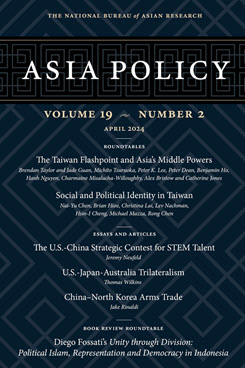Article in Asia Policy 19.2
China–North Korea Arms Trade from the Perspective of Chinese Scholars
This article examines the historical context and evolving dynamics of China–North Korea arms trade and its future scenarios, shedding light on the motivations, methods, and implications of this strategic partnership.
Executive Summary
MAIN ARGUMENT
An assessment of open-source materials authored by Chinese scholars and experts indicates that, despite international sanctions on weapon sales to North Korea, arms exports play a significant role in enhancing China’s geopolitical influence, countering the U.S., and securing a Chinese presence on the Korean Peninsula. Arms exports from China to North Korea are likely to shift from individual products to integrated systems, influenced by the adoption of systems thinking in both the Chinese and the North Korean defense sectors. Additionally, arms trade may evolve toward taking place within China’s expanding multilateral frameworks, such as the Shanghai Cooperation Organisation and the Belt and Road Initiative. China may also see a role for North Korea as an intermediary for arms sales to other sanctioned states, mirroring its historical role as an intermediary for North Korea.
POLICY IMPLICATIONS
- If arms sales from China to North Korea transform into system-based packages, then policymakers should anticipate changes in the nature and coordination of North Korean weaponry, necessitating a reassessment of defense strategies.
- If China integrates arms trade into multilateral frameworks, then it is recommended that the U.S. monitor and assess the impact of these organizations on regional security dynamics and consider diplomatic measures to mitigate their securitization.
- If North Korea acts as an intermediary for Chinese arms sales to sanctioned states, then robust intelligence efforts and international collaboration should be prioritized to enforce arms control regimes and curb illicit activities.
- If Chinese assistance enhances North Korea’s military capabilities, then counterstrategies for North Korean systems warfare and advanced technologies will be important for the U.S. so that it can continue to operate effectively in networked environments on the Korean Peninsula.
Jake Rinaldi is a PhD student at the University of Cambridge (United Kingdom). He received a bachelor’s degree in political science and Chinese from Williams College and a master’s degree in international relations from the University of Cambridge. His research interests include Chinese foreign policy, China–North Korea military relations in arms trade and cyberspace, civil-military dynamics, and Indo-Pacific security issues.
About Asia Policy
Asia Policy is a peer-reviewed scholarly journal presenting policy-relevant academic research on the Asia-Pacific that draws clear and concise conclusions useful to today’s policymakers. Asia Policy is published quarterly in January, April, July, and October and accepts submissions on a rolling basis. Learn more


